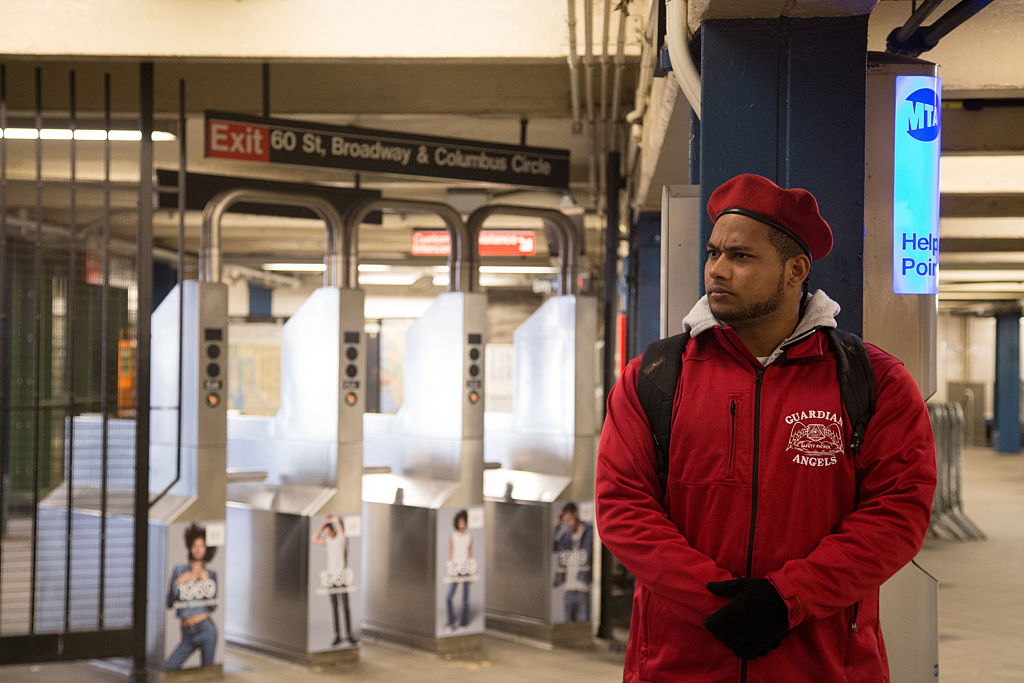
The Guardian Angels have returned to patrol New York City subways for the first time in more than 20 years after a spate of knife attacks on passengers.
Nearly a dozen underground slashing and stabbing incidents this year have prompted the unarmed crime-prevention volunteers to come back in full force, according to Curtis Sliwa, who founded the now-international organization in 1979. “People were appealing to us. They were calling us, reaching out to us. When we were on the trains, people would converse with us and say, ‘We need you back,’” Sliwa, 61, told TIME on Wednesday.
At least nine people have been slashed or stabbed in the city’s subway system this year as of Sunday, according to the NYPD, citing the most current data available. There were five incidents in the same period last year, authorities said. The city’s police commissioner, William Bratton, called the series of subway incidents an “aberration” during a recent radio interview. But Sliwa said the rash of attacks required the return of the group’s presence underground.
The Guardian Angels had hung up their signature red berets, for the most part, in the 1990s after an increase in the city’s policing when then-Mayor Rudy Giuliani took office. But the level of protection has since fallen, said Sliwa, blaming the crimes on the lack of police patrols inside subway cars and the rise of homeless and mentally ill people living underground. “There’s an aggressiveness that’s taking place in the subways that hasn’t taken place for quite some time,” he said. “My sense over the years is that we’re beginning to slip back.”
The Guardian Angels has had a controversial history in the city, especially in 1992 when the New York Times reported that the group had faked early crime-fighting exploits for publicity. Transit police also initially thought the group was a nuisance until then-Mayor Ed Koch and the Guardian Angels reached a “memorandum of understanding,” which assured police cooperation, TIME reported in 1982.
About 150 Guardian Angels have been taking turns patrolling dozens of subway lines, seven days a week, since Monday, Sliwa said. Twelve volunteers take two shifts from 11 a.m. to 6 p.m. and then again from 7 p.m. to 1 a.m. They’ve mediated about four separate fights, including one Wednesday morning between a group of young men in Upper Manhattan, Sliwa said. “They were harassing passengers, bumping into them. I stepped in and said, ‘We’re going to get off the next stop.’ They said, ‘Oh, no we’re not.’ They thought they were gonna have a beef. I just calmed the situation down.”
Sliwa said the volunteers are trained to physically intervene. At times, they take those who appear to be “really emotionally disturbed” above ground, where they alert a police officer and “demand cops take them for psychiatric reviews,” he said. The NYPD did not immediately confirm that those tests are conducted.
“It’s not a ‘see something, say something’ kind of volunteer patrol,” Sliwa said. “We’re not just eyes and ears.”
More Must-Reads from TIME
- Cybersecurity Experts Are Sounding the Alarm on DOGE
- Meet the 2025 Women of the Year
- The Harsh Truth About Disability Inclusion
- Why Do More Young Adults Have Cancer?
- Colman Domingo Leads With Radical Love
- How to Get Better at Doing Things Alone
- Michelle Zauner Stares Down the Darkness
Contact us at letters@time.com